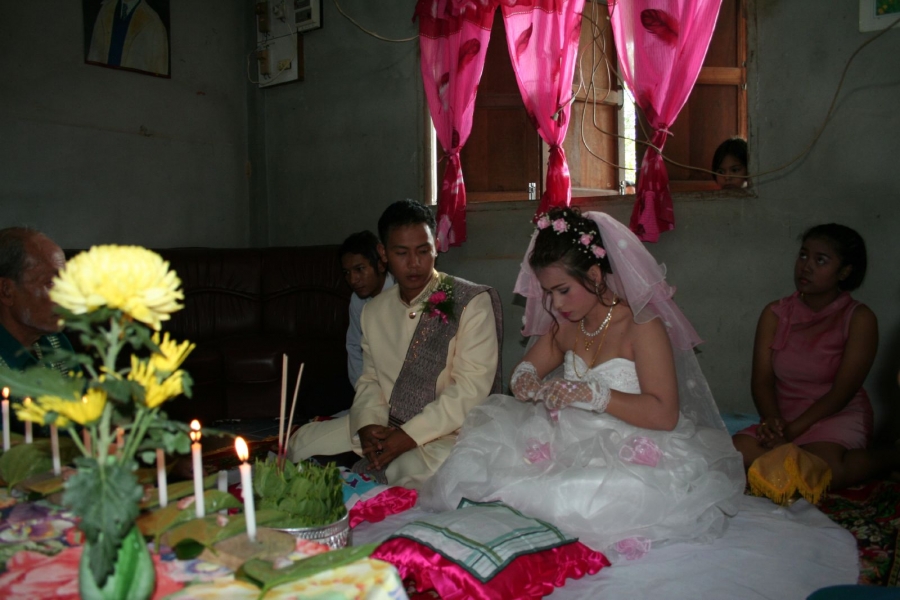6 Steps to Being the Perfect Guest at a Thai Wedding
Photo by Jeff Belmonte
A traditional in wedding in Thailand is steeped in rituals and has many elements that may seem strange to an outsider. As a guest, you will likely only be expected to attend the parts later on in the day, although for couples and their immediate families the day begins much earlier! Being able to speak and understand a bit of Thai really helps at a wedding; it means you can understand the (often very funny) speeches, stops you from feeling too bored and uninvolved, and means you can deal with the invariable questions when other guests spot a foreign face!
The religious ceremony is seen by many as constituting the “real” wedding, whereas, in actual fact, the law only recognizes the separate legal formalities. Interestingly, Thailand still observes a dowry system, whereby the intended groom and his family pay, often large, sums of money to the family of the bride to be.
There are several stages to a traditional Thai wedding. Some practices and rituals will differ, according to the region within in Thailand, local customs, and family preferences, but the common steps for a wedding in the central region are as follows:
Engagement Ceremony
The first step for any wedding is, naturally, the engagement ceremony. For practical and financial purposes, however, this often occurs on the same day as the actual wedding, with the engagement ceremony preceding the marriage ceremony.
Blessing by Monks and Merit Making
Although a Thai wedding is not required to have any religious element it is, nonetheless, common to receive a blessing by monks. This is a symbolic element of the day, typically only attended by immediate family and close friends. It is seen as laying the foundations for a happy and prosperous future together. In order to rack up merit points, as it were, couples and their families will often give (usually) substantial donations of money and/or food to the monks and the local temple. Another way of making merit is to release a caged animal into the wild; small birds and turtles are commonly set free. The intended couple may visit the temple, although many choose to have the monks visit them at home. This is early in the morning, typically before 7am, and there should be an odd number of visiting monks. Breakfast is eaten, prayers are said, water is blessed, and other spiritual rituals are performed.
Payment of the Dowry
A large showy part of a Thai wedding is the payment of the dowry, and the parade that is often referred to as the Groom’s Parade. The groom, his family, and his good friends make their way to the bride’s family home with the previously agreed dowry amount and other items necessary for the wedding. This is a fun and joyous part of the day. More often than not, when the groom reaches the bride’s home, there will be a symbolic gate or other obstacle barring his way. This gate will be guarded by female relatives or friends of the bride, who will “unlock” the gate and allow entry only after the groom has produced the key – the key is in the form of money. There is usually lots of playfulness and gentle teasing at this time, and the girls may demand even more money before allowing the groom to go inside. The dowry and other gifts are then handed over to the bride’s family, and it will all be inspected by the bride’s mother. Even without speaking a word of Thai, the theatrics and playfulness of this part make it really easy to understand!
Exchange of Rings and Tying of Thread
After the dowry has been counted, the groom is finally permitted to see the bridge again. They then exchange rings. It is then customary for the parents to tie a piece of white cotton around the wrists of the bride and groom. This is to bring good luck, and they are expected to keep the symbolic bindings on for at least three days.
Water Ceremony
A senior couple, often the parents of the newlyweds, place flowers around the necks and holy water on the heads of the couple as a blessing. Only guests who are older than the couple may attend this part of the day.
Wedding Reception
In the evening, there is a large party to celebrate the marriage. These are often lively and fun, and may be attended by whole villages and distant relatives. They are “sanuk mak mak” – lots of fun! It is not unusual for the parents to invite along guests whom the bride and groom don’t know. Guests give gifts of money in sealed envelopes, there are speeches, toasts, dancing, and the cake is cut.
To fully enjoy the day (and understand the speeches) try to learn a bit of the Thai language beforehand. What are some other Thai wedding necessities you know about?




